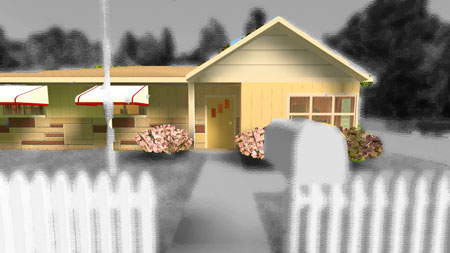When I was a young man, Dad lost everything to the bank: Jet Cleaners, a marriage, our home on Glenn Road, our predictable, idyllic, suburban routine. When we moved to town, my little sister and I were decrepit, worn out after the catastrophe. Now everyone was too close together. We staggered up the broken, treacherously icy stairs, careening like Laurel and Hardy in winter to the apartment, the sagging, exhausted house on West Gambier Street. Jo’s Chateau of Beauty was in the back, Hyle’s Typewriter Repair in the front, Kenyon and civilization five miles east, the flat, monotonous Midwest five miles west. It was there I became acquainted with Old Clyde and Mrs. Hill, though I failed them both.
Clyde was “Old Clyde” as we only knew him as old, and we never wondered if he was ever young. Clyde rarely drove his long, wide, black Oldsmobile he named “The Machine.” We worried for him and pedestrians in general when he fired up its engine on cold mornings. Clyde was a frail, pale but dignified gentleman (neither “spry” nor “geezer” applied) who shuffled alone through his white house. Once Victorian, once modestly grand with a little gingerbread embellishment, the porch leaned as if it said, “Give me a minute.” His wife loved the view out the kitchen window.
Clyde looked forward to saying “howdy,” though half his resources for the day were expended in one greeting. As Clyde was essentially deaf, the entire neighborhood knew his narrative. We were never sure if his volume was for our benefit or his. When Clyde wanted to accomplish one last home improvement, he hired me to paint his dining room ceiling. I wondered who there was to entertain. But brittle wallpaper peeled beneath the new, white coat, rolling with the roller, the task a disaster. I gave up on it. After forty years, the image remains crisp: Clyde’s crestfallen expression, the defeat in his shoulders. Dad offered no wisdom for me when I failed Clyde, when I refused to take his money.
Mrs. Hill was the only old black woman I knew in our town in 1978. We never knew her first name, but imagined Esther, Agnes or Helen. Mrs. Hill lived in the faded, green house, a hideous pea green of army fatigues, one particular patch of jungle camouflage, but surely a left-over, unwanted hue. She was next to where we tore down the garage for more parking. Tools still hung there. Clyde must have borrowed hammer, pliers or saw from the previous owner. They might have been friends, their wives gossiping and cooking together. Both widowed, Old Clyde and Mrs. Hill shared a fence.
Mrs. Hill sat in her house dress in her lawn chair on her concrete stoop, waiting for her sons to stop by and looking out for my sister circling the block on her bike. There was nothing there but Mrs. Hill and her stoop. Mrs. Hill was missing a few teeth and seemed unconcerned and un-self-conscious with their whereabouts. She was balding a little on one side, and her voice rasped and wheezed from long, luxurious drags on cigarettes. But her laugh was easy, generous, and frequent, though it cost her a spasm of coughing. Her whole body shook. I thought she would topple out of her chair, and I noted the location of the nearest telephone for an ambulance. I’m sure, when she was a silly girl, young men were taken by her bright laugh and fell in love.
My identity was nebulous at nineteen, under construction; still, Mrs. Hill listened to me. She relished my youth, my impatient plans. So why did I frequently avoid her porch and walk a different street? I wish I’d noticed Mrs. Hill listening to me and paused at her stoop to fill and shorten her afternoons just a little more. However unlikely, I wish I’d somehow finished painting Clyde’s impossible ceiling.


